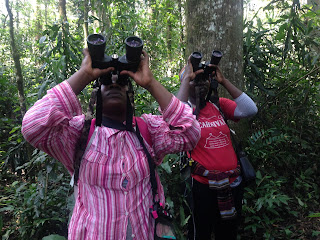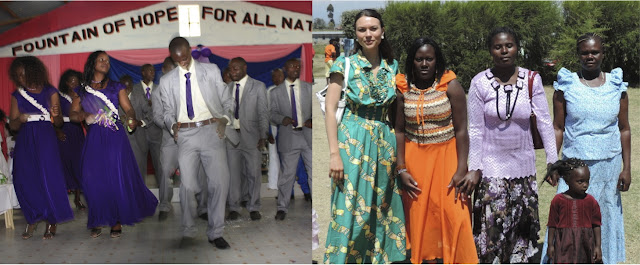Better late than never! November - what a month. It's been a reminder of a fundamental need for peace and purpose, combined please. I’ve spent a good portion of October and November (and will in January) writing grant applications alone in my little house in the forest and turning a bit gelatinous in mind and body, while my dedicated team has endured the El Niño rains. Most deadlines are past, but I won't soon forget the experience. I know that most fields are driven by a culture of "achieve, advance, pioneer " but few of them are quite so individualistic and combine a dependence on online resources with a year in rural Africa. No doubt, this is some kind of character building experience. Thank you, God.
Speaking of shaky internet - I currently don't have enough signal to wow you all with pictures. So sit tight for many to come.
I've hit my halfway mark now - 6 months in the field and 6 months to go. Yayyyy! I'm also 30 years old now. Yayyyy! ;) Really though, I'm very happy about this. Besides these two milestones, here are other things that happened in November that brought me joy.
1) I saw my friend Judith from C3 Church Manhattan (C3M) for a special weekend in Kampala, Uganda.
2) I got to listen to a podcast of my sister preaching an awesome message at C3M!
3) I got a wave of kind messages, letters, and a few care packages from amazing people for my birthday.
3) We finished our second period of data collection fully on target.
4) I celebrated Thanksgiving with my buddy and coworker Lauren by seeing a movie (in a real cinema!) and having lunch in Kisumu.
Aaaaand now my dad and his partner Marilyn are here for a visit! We are currently in the airline terminal to take a small plane to the Maasai Mara. Be assured, LOTS of photos of that to follow!
I'm shifting gears now to address two things plenty of people have asked me about: what's the language situation like and why does my day involve so much excrement ;).
Language/Relationships~
After six months, my Kiswahili has improved polepole (slowly). Many people who live in the immediate area know that I know a few words and our conversation can move past - "she is speaking Swahili!" and my response that "… yes indeed I try." My greatest motivation was to have more authentic relationships with people… and to defend myself in the ever-so-occasional negative situation. Typically, people in Kenya learn their local language first (Kiluhya in my area), then Kiswahili in grade school, and soon after English, the second national language. So almost everyone does know English, but I prefer to catch heckling motorbike drivers unawares in Kiswahili... muaha-ha. On my team I speak casually in Kiswahili, but revert to English when I really want to be clear on something - instructions, schedules, money - so quite a lot really.
Monkey poop / Monkey pee ~
Aha, you've been waiting to hear about this, I'm sure! What am I doing with this stuff… Ultimately, the responses to my grant proposals will decide, because all laboratory analyses cost $$$. But first off, why collect poop and pee. When doctors want to give you a thorough check, they usually send you off to give a blood sample, which you may be more or less happy to give. For a wild monkey to give blood you need to trap it, immobilize it, and have epic amount of permits, training and equipment. Even then, other monkeys that watched you trap their brother may never come to trust you in their midst again! We avoid this major headache and opt for a more minor one of
collecting poop and pee from the ground and leaves. In this “excreta” them you can find lots of information or “biomarkers” that are also found in blood.
My research is about measuring the benefits of friendly social relationships of the younger monkeys. Very cuddly. So, a few ways that I've defined benefits are things like increased energy intake, lower baseline stress levels, and decreased rates of infection. You can measure the signals of all these things from excreta. I’ll probably let you know which ones I do examine — i.e. which ones I'll afford ;).
Hope you’re all having a wonderful holiday season, whether it be in snow or sun. God bless!
Lots of love,
Nicole









































